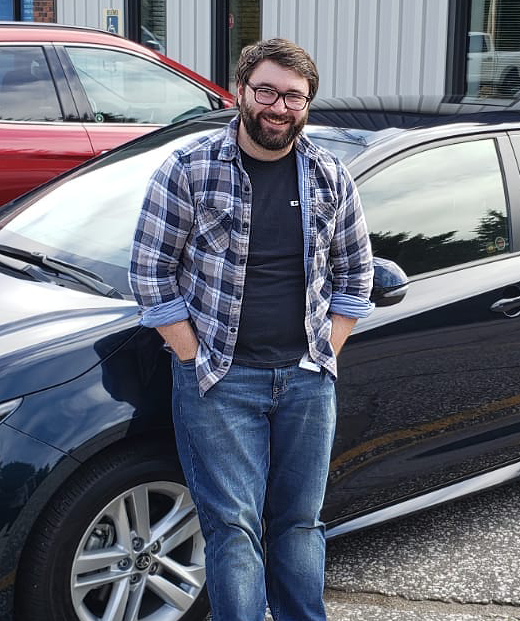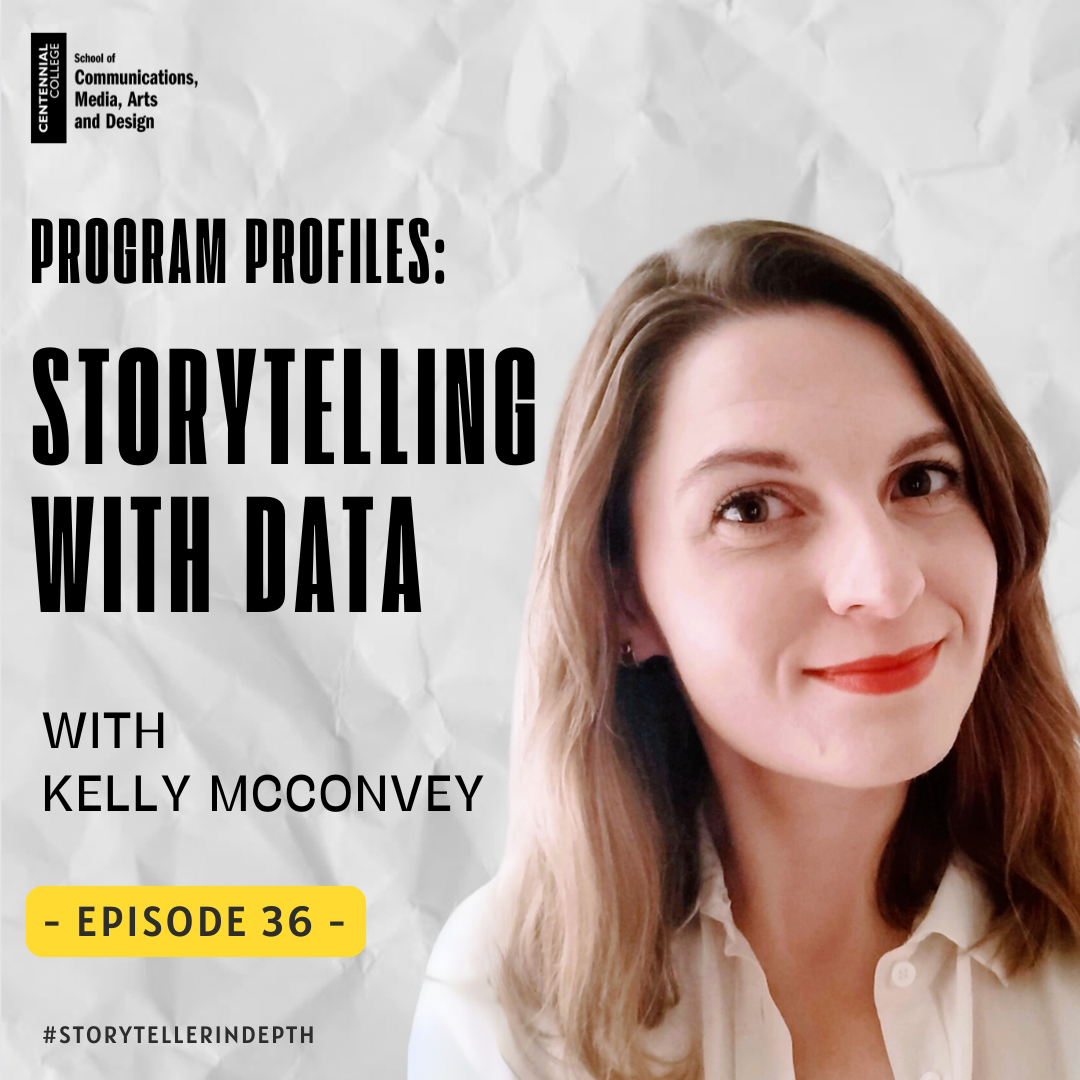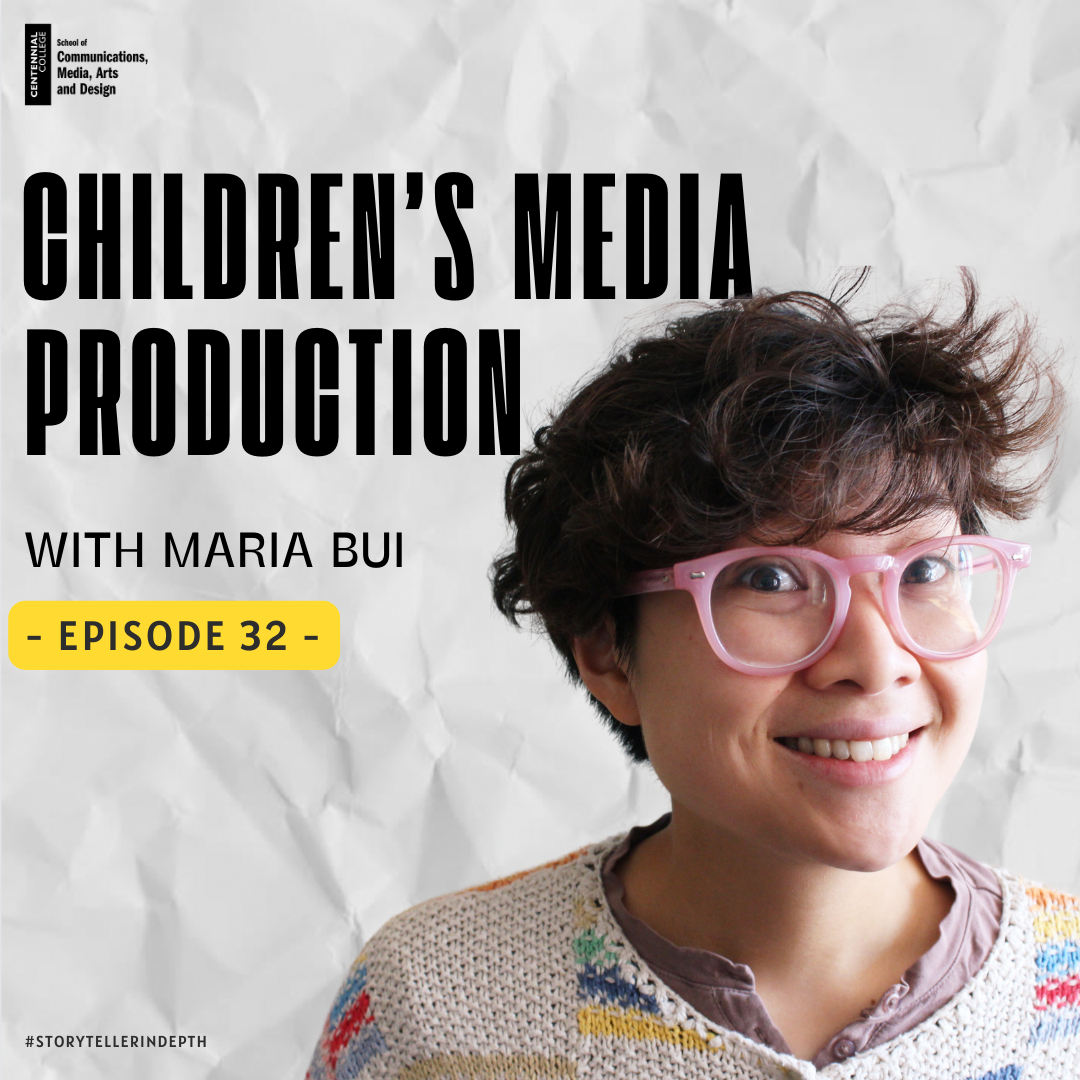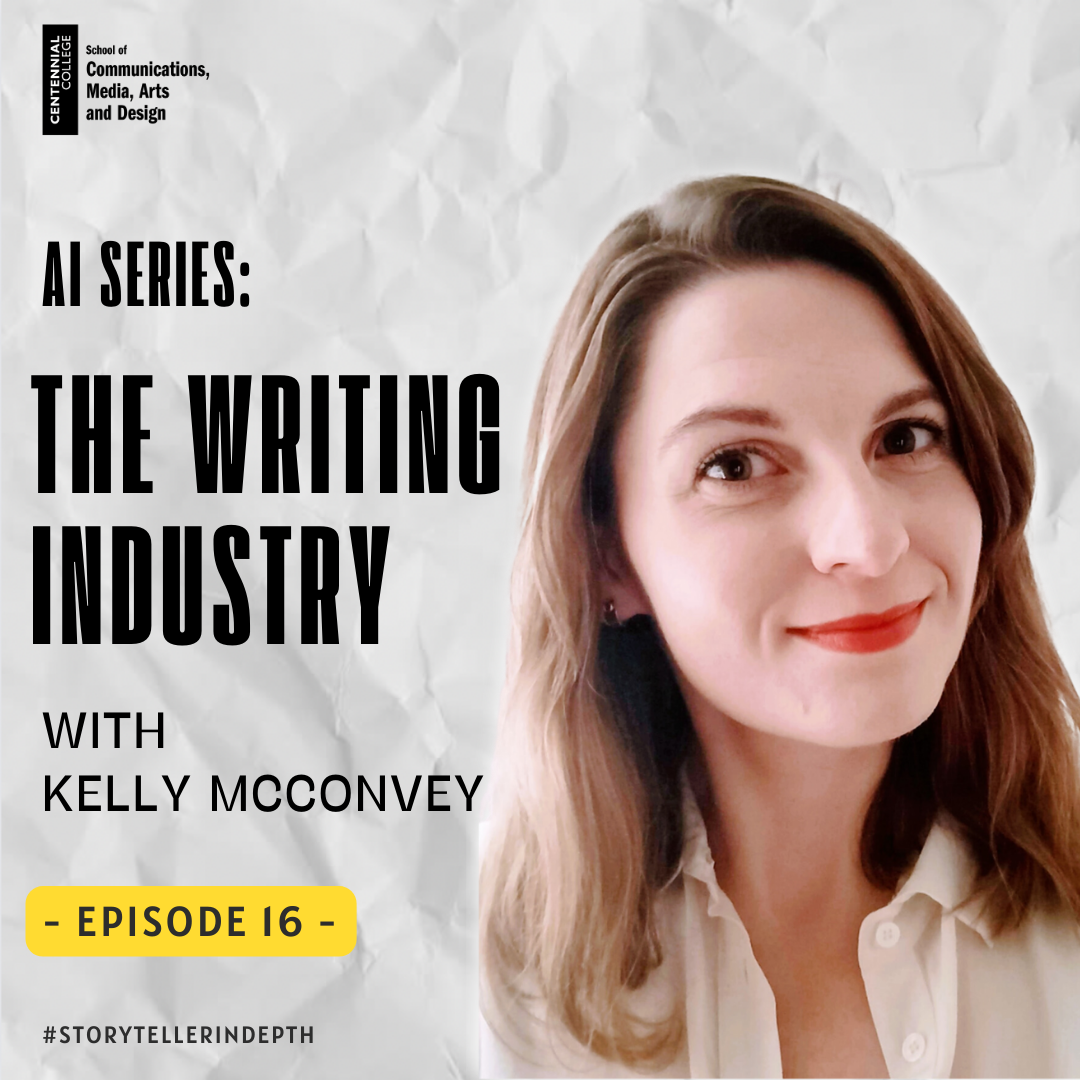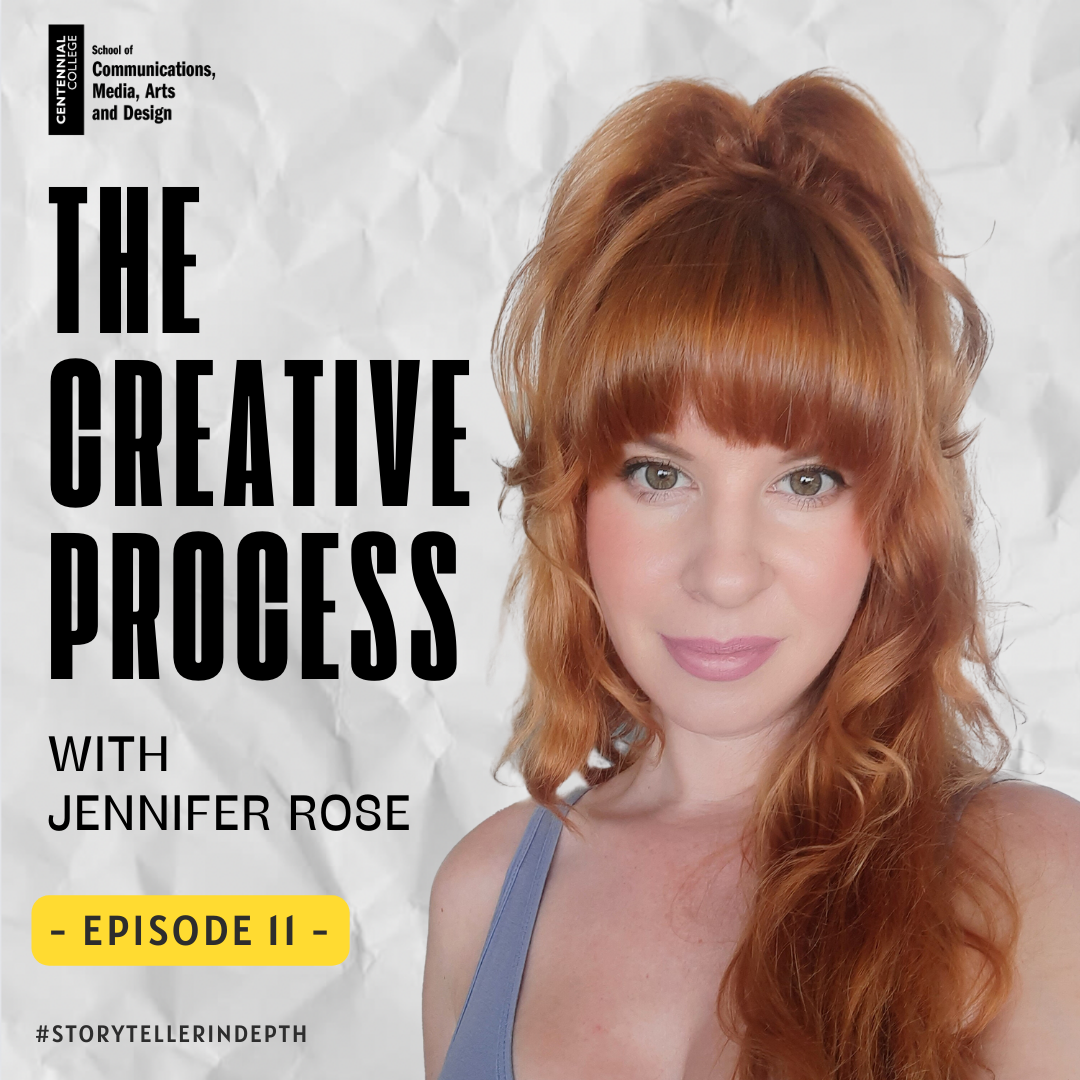Episode Transcript
[00:00:00] Speaker A: Hello and welcome to Storyteller in Depth, a podcast where we go behind the scenes to learn more about the School of Communications Media Arts and designs people, places and things. I'm your host, Pat Quigley. In today's episode, we'll be diving into something very exciting. A first look at Centennial's brand new program, Storytelling with Data. Now. That's right, you're getting the inside scoop at a first of its kind graduate certificate program designed to equip students with an incredible toolkit of skills tailored for today's data driven world. Joining us to explore this innovative program is Kelly McConvey, the program's creator and coordinator and now a two time guest on this very podcast. Kelly's here to unpack what makes this program so unique and how graduates will have the necessary skills to incorporate human centered data analysis into their work, which you'll hear about in just a little bit. Why it's such a valuable skill set to have. So whether you're considering enrolling already, signing up, curious about how storytelling and data intersect or, or just want to hear about what this new program is all about, this episode is for you. Let's jump right in.
[00:01:06] Speaker B: So thank you so much, Kelly, for coming back on the podcast.
[00:01:10] Speaker C: Thank you for having me.
[00:01:11] Speaker B: Yeah. So to start off, so we can get a big picture perspective before we get into the specifics of this exciting new program, what is a data storyteller?
[00:01:22] Speaker C: Yeah, good question. A data storyteller is someone who not just doesn't only know how to use analytics tools or derive insights from data, but really understands how to communicate those insights to make meaningful change or drive decision making or whatever it is that they're using the data for. So data stories can be visualizations, they can be dashboards, they can be presentations, they can be reports, they can even be books. You know, they can, they're long used in journalism. Like data journalism is a pretty established field, but we're really seeing the need for, you know, as data drives more and more of the decisions and more and more of what we do every day across all these different industries, we're seeing a need for people who know how to communicate that data in plain language and to all the different sort of stakeholders that, that are involved in this decision making.
[00:02:18] Speaker B: So what kind of skills or traits do they have?
[00:02:22] Speaker C: So it's a really varied skill set, which is what's so exciting. It's using data tools like something as simple as Excel and Tableau, to coding in Python or SQL, to really communicating and using those communication tools. So what is Narrative. How does character factor in? If you're telling a data story, how do you put together a visualization or a dashboard?
But really, you know, how do you engage audiences in that data to understand that more often than not, data is talking about real humans and we're making decisions with data that are going to impact those humans daily lives. So it's centering that human experience, or you know, beyond humans, like global or sustainable experience within that, that data story and using that data in an engaging, meaningful way to make change.
[00:03:20] Speaker B: So what got you so interested in this, this form of storytelling and then what inspired the program's creation?
[00:03:28] Speaker C: Yeah, fair. It's a long and twisting road. So, you know, I, I started as a storyteller in my career when I was like way back when I first went to college. I was actually in theater. I was a scenic painter and set designer. And I've always sor. Been inspired by story. I think story is what drives empathy and engagement and thoughtfulness. I think story is what we turn to in hard times and in good times. You know, I think story is so central to a joyful life and a joyful experience.
So I really did start my career in storytelling and then I worked as a technical writer, which is a very dry but still valid form of storytelling. And while I was working as a technical writer, I started writing about AI before we even called it AI, back when we called it like decision sciences.
And that really, you know, that blew my mind. I was so interested and inspired by that work that I started to pursue data and AI more fulsomely. Um, I completed a over Covid a master's in management in artificial intelligence at the Smith School of Business at Queens.
And from there I went, I took a leave of absence from Centennial and went and worked at Deloitte for, for a few months in their Omnia AI team on their trustworthy AI division. And that experience was really eye opening. It was in the middle of COVID I was working on an AI team full of engineers and AI strategists. And I was seeing how much Deloitte was struggling with hiring people who could communicate the findings of the data. It was quite easy to find engineers, to find data scientists, data analysts, data coordinators. But those people often lacked the skill set to go one step further than what this data is saying and say, well, what does that mean? What does that mean for people? What does that mean for decision makers? What does that mean for businesses or organizations or, you know, citizens? And they were really, they were really struggling with it. And at the same time, you know, Covid was sort of raging through, we were in and out of lockdowns and you know, I'd always sort of felt that the general population needed to understand data more. It's becoming used to make decisions so much more frequently. It's such a crucial part of every business's operations or every industry's operations.
But I wasn't always successful in convincing people of that, especially people coming from creative and cultural industries. And then Covid and we spent three years looking at logarithmic charts and watching data points change every day. And you know, people were tracking data like you track the weather.
And it really, it hit me during that experience how, how core this is to, you know, to everything that we do and how much sort of interest there was in the general population to understand data more. So that's really what brought me to the idea of the programmer. These combined experiences and this understanding that, you know, business isn't owned or, sorry, data isn't owned by any particular group. It's not owned by the mathematicians or the business people or, you know, the informatics people or whatever area. There's a lot of different groups in academia and beyond who sort of claim data as their own. But really data is for everyone. It impacts everyone. There isn't an industry that isn't, you know, turning to more data driven processes and decision making, but the creative and cultural industries specifically have kind of been left out of that. Right. There aren't a lot of places where people who don't consider themselves math people or data people can go to learn these skills and especially learn these skills specific to their industries. And then it also occurred to me that, you know, at Centennial College, at the School of Communications, Media Art and Design, where I've been for over 10 years, there's, there's nowhere better to learn storytelling. There's no better place or no place that's better positioned to teach storytelling. So, you know, in a lot of ways we're the perfect place for this, where we're answering a need that is seen across industries and across businesses for these data storytellers. We already understand story with a nuance that is really lacking in other areas. And we're seeing our creative and cultural industries and our students really need data in a way that they haven't before. So it kind of came together perfectly to, to make me realize that this is the right, the right time, the right place and the right program.
[00:08:08] Speaker B: No, it definitely seems like it's an, it's a definitely an added bonus right to in A day and age where you need to be able to do a little bit of everything, right. To have an understanding of all these different platforms and ways of doing things, being able to have that extra layer on top of it of understanding how to tell people data and how to disseminate that to the public, that seems so important. So, you know, this sounds like an amazing program for sure.
[00:08:37] Speaker C: Yeah. And I think you hit on a good point that, you know, we're really designing this program to be open to anyone.
And with that, we, the students we're seeing who are interested in it and the students that we hope to draw, a big group of them are people who have expertise in an area, you know, who are coming from journalism, who are coming from broadcasting and film television, are coming from sports journalism, you know, coming from all these different areas with an incredible understanding of their industry, with a real skillset under their belt. And we're showing them how they can add on to that. This isn't necessarily in replacement of the industry knowledge that you've built over education and lifelong career. This is the next step, the next phase in that. And that's really what we're hoping to do with the program. You bring your expertise and we'll show you how to add data to it.
[00:09:26] Speaker B: I'm going to read a little bit of the program's description where it says standout features will include centering human stories and using data ethically in a human centered data analysis and fairness, accountability, transparency and ethics courses while telling stories using data across creative and cultural disciplines. Now, can you share a little bit about what this means and why human centered data analysts analysis, sorry, is so important in today's world.
[00:09:55] Speaker C: Of course, I think a lot of what people dislike about data is it has an element of abstraction to it. It can be reductive at times. Right. It limits people or reduces people to some numbers and points on a graph. And for a lot of people, you know, myself included, that's quite uncomfortable. That idea that anything meaningful about you can be summed up in a point on a graph.
And so that's where the human centeredness really comes in, is that it's important that everyone working in this field remember that those, those, you know, graph points are people.
The data that we're working with is data collected about people and the decisions being made are going to impact people. And we've seen so many cases of data being used, you know, incorrectly or often in a sort of sloppy manner, it's not even intentional. But the, the people, you know, where the harms really come through are the people who suffer from those decision making processes. So that is a key element for us is that this is data about humans. It's data for humans. It's data that impacts humans and even beyond humans, like environment, sustainability, you know, global perspectives, all those things are sort of at the core of what we say, when we say human centered.
I would love to make a case for animals as well. If we can bring some animal data sets in, I would be thrilled because I think it goes far beyond just humans, but all living things and their environments. So that's really what we're doing. And it's a, well, sort of recognized area of academia and research, this human centeredness, human centered design processes or human centered AI. And we want to bring that through this program into industry. We want industry to think about the humans that are at the core of what they're doing. And storytelling is such an accessible way to do that, to bring in that empathy piece and really connect to the humans behind the data. And some of that involves ethical data collection, ethical responsible data use, data governance and those things. And then sometimes the question is, is this even where we should be using data? Is this data we should be using for this purpose? So it's having all of those questions at the forefront and remembering that, you know, there are no business goals that should be put above the people and the planet and focusing on that.
[00:12:34] Speaker B: So this program includes a mix of design, communications and analytics courses. Can you explain why this combination is important? Especially when navigating industries like film, television, advertising, journalism, cultural management spaces, games and esports?
[00:12:49] Speaker C: Yeah, so I often think I. Many people have heard me say this before, but I think about. There's a Sesame street adage that I like to use that when they were originally hiring for Sesame street, they were trying to decide whether they should hire educators to write the episodes or if they should hire comic writers, like humor writers, to write the episodes. And in the end they decided to hire comedians and comic writers and teach them education because fundamentally that's easier than teaching education professionals to write comedy, which is something I really agree with and I kind of have the same, the same take on this. In a program called Storytelling with Data, I think the storytelling piece is the much more difficult piece than the data piece. So it was important that the program does two things that it treats these three areas that we're looking at, which is data and human centered data storytelling, like narrative and design best practices. So visualizations that we approach these separately and then we look at them together in a combined way. And see how they support each other and how they can be used in conjunction. So that's really what we're doing. So, you know, our students might come in with no experience in any of these three areas. And that's, that's awesome, you know, that's great. But they might come in as established storytellers who need the other two pieces, or come in as, you know, established graphic designers who need the storytelling, maybe less so, but, and especially the data part. So that's really how the program is built, to view these three separate areas that are well established, well researched, have a long tradition and history in training and academia, but then putting them together and showing how they complement and support each other. And in that way, I think the program really is appropriate for someone from any background. You know, you can be a school of communications, media art and design grad who, you know, works in sports journalism, or you can be a grad of the school of engineering, you know, and have that data skill, but not necessarily the storytelling. So it opens it up to be really accessible to everyone. And that is one of the main motivating factors behind the design of the program.
[00:15:07] Speaker B: What are some of the common mistakes people make when trying to tell stories with data? And as a result, how does this emphasize the importance of effective data storytelling?
[00:15:19] Speaker C: Really, I think one of the common mistakes is that I think we all think we're way better at understanding probability and percentages in our heads than we actually are.
Someone was just telling me a great example the other day that this is a made up number, so don't quote me on this, but that 40% of people don't wash their hands after using the bathroom. Let's say super gross, but let's say that that's the number 40% don't. And you know, that's like, okay, gross. That kind of means something to you. But then if someone says to you, Instead of the 10 people you shook hands with today, four of them hadn't washed their hands or hadn't washed their hands first, like, that's a very different thing to connect with, you know, so that's kind of like one of the big mistakes is that I think when you've been sitting with data and working with it and trying to extract meaningful insights from it from a long time, you forget that just sort of shouting percentages at people or shouting averages at people isn't always as meaningful as it could be or as you think it is. So finding ways to connect that, you know, again, with empathy and with storytelling skills, you know, you'll find you'll have a much easier time persuading people with that information. I think the other big issue that we see with data often is that we think it's a ground truth. We think that statistics or data, you know, if something's data driven, it has to be true, it's infallible. But all kinds of assumptions go into any kind of data science practice or into any kind of data analysis. And those assumptions and even the outputs can be spun in a lot of different ways. Data now is being used for propaganda and from misdirecting people, I think, honestly, as much as it's being used to provide insight into things. So this idea that data is infallible and is always good, I think is really a problem for society and a problem for individuals and a problem in the way that we approach numbers and thinking.
So for me, the way to combat that is with the storytelling piece. When you combine, you know, quantifiable insights with, you know, qualitative data where you've actually talked to the people, where you've been on the ground, where you have real quotes, when you have real people behind the, the percentages and the data points, it not only becomes more convincing, but it becomes more honest and more trustworthy.
[00:17:59] Speaker B: Yeah, I'm even thinking of like back in the examples and I hate using the pandemic and Covid as like the largest example, but it's the one that's always top of mind. Even still, you know, we were inundated with numbers for so long where it's like, here you go, here are the numbers, here's what's going on, blah, blah. But until there was a story behind it, like, hey, here is so and so. Who is one of X, right? Who's affected by what is happening. Suddenly you have a different perspective where you're like, hey, maybe I should be taking this more seriously because of the storytelling aspect.
[00:18:36] Speaker C: No, exactly. Like, you know, I'm making this up again. But a 10% fatality rate in old age homes is really different than your friend's grandmother dying. You know, like, they're just different things. They hit different.
Yeah, I think Covid has so many rich examples of that, of the importance of it.
[00:18:53] Speaker B: So now if someone was interested in this program but might be a little bit hesitant, what would you say is important for them to know?
[00:19:05] Speaker C: I often, when I'm thinking about this program is such a terrible example. But I think of the Barbie where you like pull the string in the back and it says, I hate math. Which is just horrific in so many ways. But I hope, like, I hope that any students who feel like that, Barbie, who I identify with the I hate math Barbie, understand that this program, it's not a math program at its heart. You know, we'll use math, we'll use data, but it really is a program designed for people who don't see themselves represented in the existing, you know, like data boot camps that are available and things like that. We are going to approach this differently, we really are. And we're going to make it as accessible as we can for anyone. The other thing on that accessibility note that I am so proud of with this program is we've developed it to be high flex. So it's available. You can attend in person or you can attend online.
And all of the courses are in the evenings and weekends. So it really is designed for you to have a full time job or to already be a student in school.
We really did want to make this as accessible both in the course material and the delivery modality as possible and open it up to as many people as possible.
So I'm really happy about that. And then on top of that, we've also offered, we have also opened up many of the courses as part time. So if you want to just, you know, dip your toes in a data foundations course or in a responsible data storytelling and governance course and see how it feels for you, you don't actually have to commit to the whole program. You can try out those part time courses and see and maybe that's all you need. Maybe, you know, in your area you don't need the full credential. I hope I can convince you otherwise, the value of it. But we really did want to make this as accessible as possible because we're seeing, you know, all across education, we're seeing if it's not realistic anymore or desirable for students to take a year or two off from their lives to go back to school and skill up in a specific area. Students really are looking for these super accessible options and that is how the program was designed from the ground up.
[00:21:12] Speaker B: So what are you most looking forward to about the program?
[00:21:19] Speaker C: I am personally really looking forward to converting people, converting the I hate math Barbies of the world. I am really, really looking forward to, you know, seeing if I can. I'm so hopeful that I can make data so accessible that students leave saying, hey, maybe I am a data person or maybe I'm not a data person in the traditional sense, but I'm a data person for my industry. I'm what my industry needs or my area needs. So that's what I'm personally excited for. I think if I was a student though, we would be really excited for the StoryWorks course. In our StoryWorks course, we're partnering with real organizations each semester who will provide a data set and our student groups will form small teams and work through sort of like a semester long data thon.
Data storytelling. A thon if you will, work through that organization's sort of data problems and then pitch or present, you know, their data story back to them. So I'm really excited for that. I think working in data theoretically versus working with real life data are two very different things. So I can't wait to see our students sort of on the ground in action with real human data, centering these humans within their analysis and then presenting what they find back to the client.
[00:22:44] Speaker B: Kelly, this sounds like such a unique and fun program that I'm nearly convinced myself that I should be taking it honestly, because I'm sure there's a couple of things that I could do to, to, to level up what I do now. So, so thank you so much for, for teaching us a little bit about what's going on.
[00:23:03] Speaker C: Oh, of course. Thank you so much for having me. I'm just, I'm so excited for it, so. And the students we've been talking to so far are so excited for it. So I think it's going to be a really cool and as you say, unique opportunity to bring together people from all different industries and you know, innovate some, some exciting new skill sets.
[00:23:30] Speaker A: Now, how cool does this new program sound? If you're ready to blend creativity with data driven storytelling and develop skills that are in demand across industries, the Storytelling with Data program can be a great move. For more details about this one year graduate certificate program program and a closer look at the courses, you can visit Centennial's full time program list at www.centennialcollege.ca.
programs and courses and either search Storytelling with data or type in the program code 6015. If you're a part of the program's first cohort or are a listener from the future thinking of enrolling in subsequent cohorts, we would love to hear from you. Visit our Instagram storyyardcenter and leave us a comment on this as Episodes post letting us know. Until next time, I'm your host Pat Quigley and this is Storyteller in Depth.
